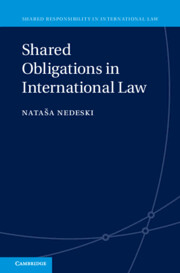Book contents
- Shared Obligations in International Law
- Shared Responsibility in International Law
- Shared Obligations in International Law
- Copyright page
- Contents
- Figures
- Table
- Acknowledgements
- Abbreviations
- 1 Setting the Scene
- 2 The Concept of Shared Obligations in International Law
- 3 The Distinction between Bilateral and Multilateral Legal Relations in the International Law of Obligations
- 4 Indivisible and Divisible Shared Obligations in International Law
- 5 Sharing International Obligations and the Determination of Shared Responsibility
- 6 Claiming Cessation and Reparation for Breaches of Shared Obligations
- 7 Conclusion
- Index
5 - Sharing International Obligations and the Determination of Shared Responsibility
Published online by Cambridge University Press: 07 July 2022
- Shared Obligations in International Law
- Shared Responsibility in International Law
- Shared Obligations in International Law
- Copyright page
- Contents
- Figures
- Table
- Acknowledgements
- Abbreviations
- 1 Setting the Scene
- 2 The Concept of Shared Obligations in International Law
- 3 The Distinction between Bilateral and Multilateral Legal Relations in the International Law of Obligations
- 4 Indivisible and Divisible Shared Obligations in International Law
- 5 Sharing International Obligations and the Determination of Shared Responsibility
- 6 Claiming Cessation and Reparation for Breaches of Shared Obligations
- 7 Conclusion
- Index
Summary
This chapter explored the implications of sharing obligations for the determination of shared responsibility, underscoring the relevance of distinguishing between two types of shared obligations throughout this process. After all, the implications of sharing obligations for responsibility relations differ depending on whether the shared obligation breached is of a divisible or indivisible character. Where a breach of an indivisible shared obligation can only result in shared responsibility for a single wrongful act – which entails that the sharing of an obligation that is indivisible always has one inevitable implication for responsibility relations – a breach of a divisible shared obligation has no such automatic implications for the responsibility of states and international organizations concerned. Instead, when a divisible shared obligation is breached, different outcomes in terms of responsibility remain possible. Depending on the circumstances in which the divisible shared obligation is breached, a breach may give rise to shared responsibility for a single wrongful act, shared responsibility for multiple wrongful acts, or may even give rise to the responsibility of only one of the states or organizations that bear the obligation (though it should be noted that, in practice, breaches of divisible shared obligations are likely to occur by multiple duty-bearers).
Keywords
- Type
- Chapter
- Information
- Shared Obligations in International Law , pp. 144 - 178Publisher: Cambridge University PressPrint publication year: 2022



